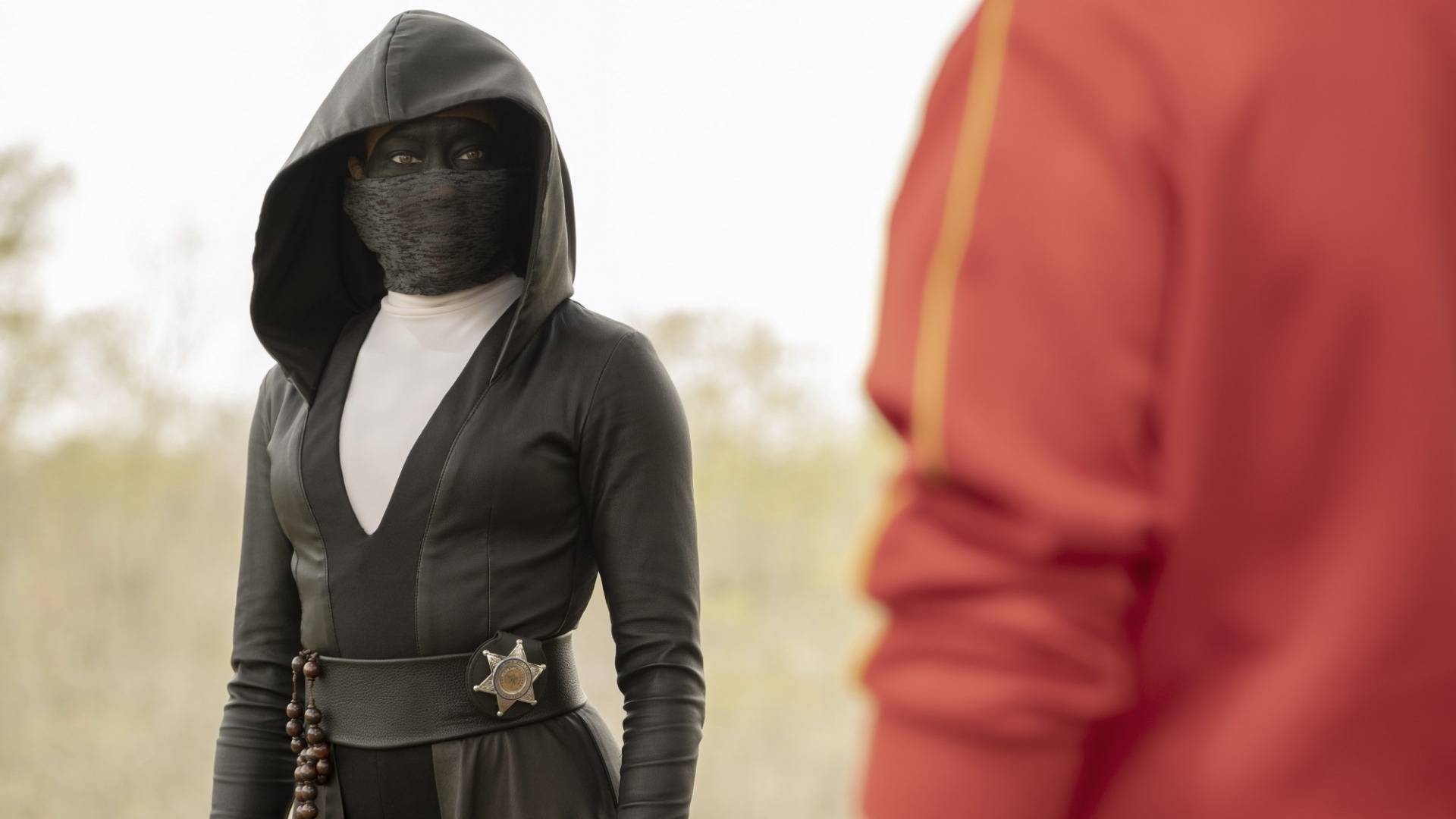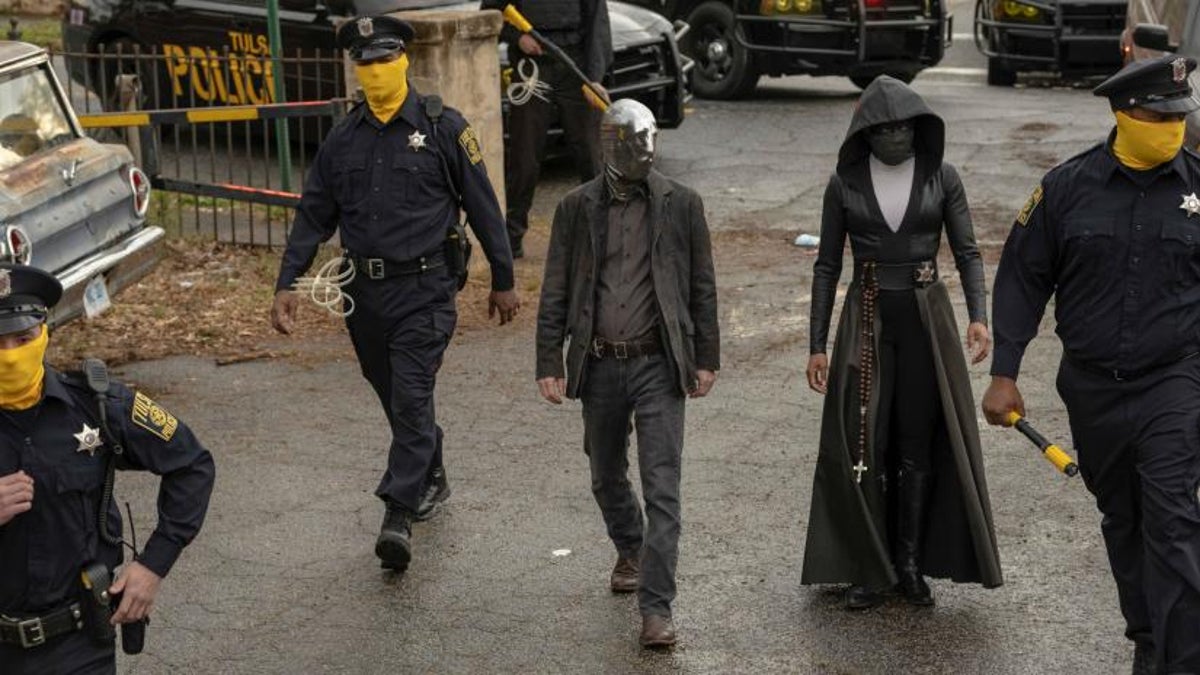GamesRadar+ Verdict
Not content with merely being a Watchmen sequel, the HBO series forges its own path with an utterly compelling premiere filled with mystery and intrigue.
Why you can trust GamesRadar+
Showrunner Damon Lindelof has delivered the almost impossible: the beginnings of an essential sequel to Alan Moore and Dave Gibbons’ seminal work, Watchmen.
The first episode of the Watchmen HBO series marks one of the best hours of television you will watch this year. Arriving fully-formed and with a cocksure swagger, the premiere presents an opening salvo as maddeningly obtuse, dense, and captivating as the first pages of the source material. And, as with all of Lindelof’s best work (Lost, The Leftovers), the episode begins in a truly unpredictable fashion.
A young boy is watching a black and white film. We’re in Tulsa, Oklahoma, and the year is 1921. Not exactly the start Watchmen fans eager to see the Minutemen and Doctor Manhattan were expecting. As the boy leaves the cinema, chaos erupts. These are the Tulsa Race Riots, famously "the single worst incident of racial violence in American history," and they are vividly directed by Nicole Kassell; clouds of dust intermingle with bullets and bodies are dragged away by a horse-and-cart in the streets. Things come to a head as the boy finds himself standing in a dark field as a baby cries beside him – a mystery folded inside another mystery and, if you’re familiar with Lindelof’s prior works, it’s one you’re going to want to keep in the forefront of your mind.
Despite the present-day being almost 100 years later, the visceral first scene offers a window into a world fraught with racism – a topic that echoes throughout the rest of the episode as police officers fight against a new clan of white-supremacists known as the Seventh Cavalry; a Rorschach-inspired group who adorn the familiar blotched mask of the anti-hero. Fighting against the terrorists is Regina King’s Angela Abar, who works in secret with the Oklahoma Police Department as the costumed hero Sister Night. After a member of the previously thought dormant Seventh Cavalry guns down an officer – in an intense, breathless scene – Sister Night goes on the hunt for anyone with information.

Intriguingly, things soon spiral into an original tale that’s both detached from the Watchmen comics and completely beholden to them. This is a sequel, make no mistake, but one that can also stand alone. There are nods and references galore, each one inviting a re-watch to glean some hidden, unexplored meaning found at the edges of the masterfully-constructed world. In one particularly surreal scene, giant squids rain down on Angela’s car. Rather than panic, she matter-of-factly wipes the oozing slimes off her windscreen.
This, as comic readers will know, is the leftover effects of Ozymandias’ diabolical, yet world-saving, scheme – one that saw the villain create a population-halving giant squid that caused the world to unite together in order to defeat. However, in Lindlof’s show, there’s no origin story; no dialogue explaining why the heavens are raining calamari. It’s a bold creative choice and, even if you’re not a Watchmen aficionado, you will be equally hypnotised and baffled. Some reading may be required at a later stage, however, as there are no signs of the series mollycoddling you with details of what happened to Doctor Manhattan or how Robert Redford became president.
Speaking of the comics, Ozymandias is back, with Jeremy Irons appearing as the character. Yet, Adrian Veidt, the watchmaker’s son’s actual name, has been declared dead. This misdirection permeates his smattering of screen time, which punctures the premiere with a handful of bewildering scenes that somehow marriages Downton Abbey with Twin Peaks. Irons clearly relishes playing the oddball character, a man who has slinked back into a country estate filled with doting servants, honeycomb anniversary cakes, and musty typewriters. Along with King’s exceptionally grounded and intense performance as Angela, the two actors are highlights in an episode laced with instantly iconic scenes and richly-drawn characters (and that’s all without mentioning the oppressive soundtrack composed by Trent Reznor and Atticus Ross).
Of course, it’s the final scenes that will have you whiling away the hours until next Sunday. After back-and-forths with the suspiciously strait-laced police chief Judd Crawford (played skin-itchingly well by Don Johnson), Angela eventually retreats for a late-night liaison with her husband. Then the horrors begin – a mysterious caller, the threat of someone possibly entering the home, and a white man lynched from a tree. In the comics we asked ‘Who killed The Comedian?’ Here, it’s ‘Who killed Judd Crawford?’ No doubt his untimely demise will be felt through the next eight episodes.
The scope, then, of the Watchmen opener is staggering in its pure ambition. The episode goes from being a historical drama, to a superhero show, to a series of mystery boxes being opened, all before ending with a chilling closer. Even Alan Moore would be hard-pressed not to begrudgingly applaud Lindleof’s vision.
I'm the Senior Entertainment Writer here at GamesRadar+, focusing on news, features, and interviews with some of the biggest names in film and TV. On-site, you'll find me marveling at Marvel and providing analysis and room temperature takes on the newest films, Star Wars and, of course, anime. Outside of GR, I love getting lost in a good 100-hour JRPG, Warzone, and kicking back on the (virtual) field with Football Manager. My work has also been featured in OPM, FourFourTwo, and Game Revolution.





